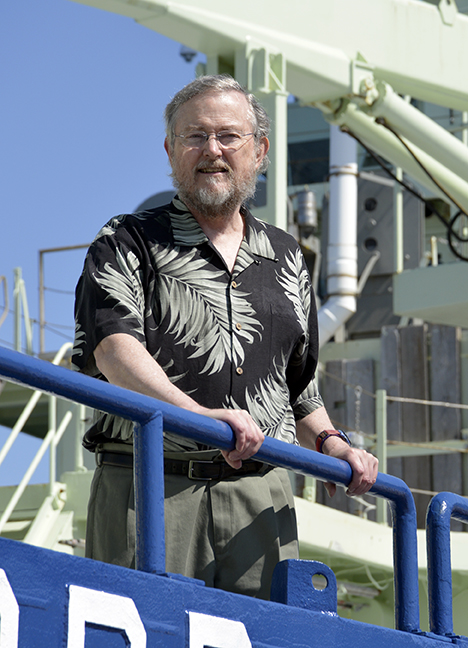
Dr. John M. Toole
Emeritus Research Scientist
Department Physical Oceanography
Contact Information:
Work: 508-289-2531
jtoole@whoi.edu
Office: 211A Clark Laboratory
Mailing Address:
266 Woods Hole Road, MS #29
Woods Hole Oceanographic Institution
Woods Hole, MA 02543
Research Interests
- polar ocean processes, air-ice-ocean interaction
- mechanisms and intensity of ocean mixing and its influences on circulation
- air-sea interaction and water mass transformation
- variability of the ocean's stratification and circulation at seasonal, interannual and decadal time scales
- instrument development
Selected Recent Publications
- Timmermans, M-L, and J. Toole, 2023. The Arctic Ocean’s Beaufort Gyre. Ann. Rev. Mar. Sci., 15, 223-248. doi.org/10.1146/annurev-marine-032122-012034
- Son, E.Y., Y. Kawaguchi, S. T. Cole, J. Toole and H. K. Ha, 2022. Assessment of turbulent mixing associated with eddy-wave coupling from observations with ITP-Vs in the Canada Basin. J. Geophys. Res., 127, e2022JC018489. DOI: 10.1029/2022JC018489.
- Toole, J.M., R.C. Musgrave, E.C. Fine, J.M. Steinberg, and R.A. Krishfield, 2023. On the vertical structure of deep ocean subinertial variability. J. Phys. Oceanogr., 53, 2913–2932 DOI: 10.1175/JPO-D-23-0011.1
- Zimmerman, M. T., S. R. Jayne, L. Rainville, C. M. Lee, J. M. Toole, J. B. Edson, C. A. Clayson, A. K. Ekholm and C. R. Densmore, 2024. Observations of the upper ocean from autonomous platforms during the passage of Extratropical Cyclone Epsilon (2020). Oceanography, DOI: 10.22541/essoar.171042728.80062955/v1.
- Rabe, B. and 49 others, 2024. The MOSAiC Distributed Network: observing the coupled Arctic system with multidisciplinary, coordinated, platforms. Elementa: Science of the Anthropocene. DOI:10.22541/essoar.171042728.80062955/v1
- Jacobs, G.A., R.W Helber, J.M. Toole, E.J Metzger and T.G. Jensen. 2025. North Atlantic Water Masses relations to Upper Ocean Sound Channels. J. Acous Soc of America, in press.
- Toole, J.M., A.J. Fougere, J.K. O’Brien and D.L. Fougere, 2025. The D-2 Hybrid CTD: Description and Evaluation. Journal of Atmospheric and Oceanic Technology, submitted.
- Fine, E., R. Musgrave and J. Toole, 2024. Near-inertial wave generation, propagation, and dissipation: full-depth observations at four subpolar mooring sites. J. Phys. Oceanogr., in revision.
Awards
Fellow of the American Geophysical Union, 2004
Fellow of the American Academy of Arts and Sciences, 2008
Member, Phi Beta Kappa, Phi Kappa Phi, Sigma Phi Sigma, Kappa Kappa Psi
Students and other Advisees
- Principal Advisor to: S.Bennett (independent consultant), S.Wijffels (CSIRO, Australia), K. Polzin (WHOI), K. Silverthorne (ETH Zurich), I. Le Bras (WHOI/SIO), Jeffrey Grabon (USN)
- Thesis Committee Member or Member of Thesis Defense for: R. Ponte (AER), S. Rintoul (CSIRO, Australia), S. Wacongne (FSU), C. Chen (UMASS Dartmouth), J. Zemba (Waldorf School of Saratoga), R. Schudlich (unknown), E. Brady (NCAR), G. Johnson (NOAA/PMEL), M. Sundermeyer (UMASS Dartmouth), L. St. Laurent (WHOI), A. Ganachaud (IRD,France), J. Zhang (Fidelity Investments), A. Macdonald (WHOI), J. Hyatt (Mass Maritime), J. T. Farrar (WHOI), D. Stuebe (Applied Science Associates), M. Mazloff (SIO), B. Peña-Molino (U. Tasmania), R. Walsh-Dell (SIO).
- Postdoctoral Advisees: Dan Kelley (Dalhousie U.), Yves Gouriou (IRD, France), Joanna Muench (U. Washington), Harvey Seim (UNC Chapel Hill), Sabine Mecking (U. Washington/APL), Sylvia Cole (WHOI), Isabela Le Bras (WHOI/SIO), Ruth Musgrave (Dalhousie U.), Elizabeth Fine (SIO)
Education
Sc.D. Physical Oceanography, 1980. MIT/WHOI Joint Program
B.A. Physics, 1975. University of Maine
Biography
Having an aptitude for mathematics and physics and a passion for sailing, it was natural for John Toole to go into the ocean sciences, specifically the discipline of Physical Oceanography. John earned his Bachelor of Arts degree from the University of Maine in spring 1975 after spending the previous summer as a WHOI Summer Student Fellow in the Physical Oceanography (PO) Department. That experience motivated his application to the MIT/WHOI Joint Program that awarded him a Doctorate of Science degree in 1980. After a 2-year National Research Council postdoctoral position at NOAA's Pacific Marine Environmental Laboratory in Seattle, he returned to join the WHOI PO scientific staff where he advanced to Senior Scientist in 1996. In addition to advising the occasional student, John maintains an eclectic research portfolio investigating ocean mixing processes and their influence on circulation, the mean global heat and fresh water budgets and the roles of water mass formation and ocean currents, variability of the ocean's stratification and circulation at seasonal, interannual and decadal time scales and polar ocean processes, leading instrument development efforts when the science need exists.